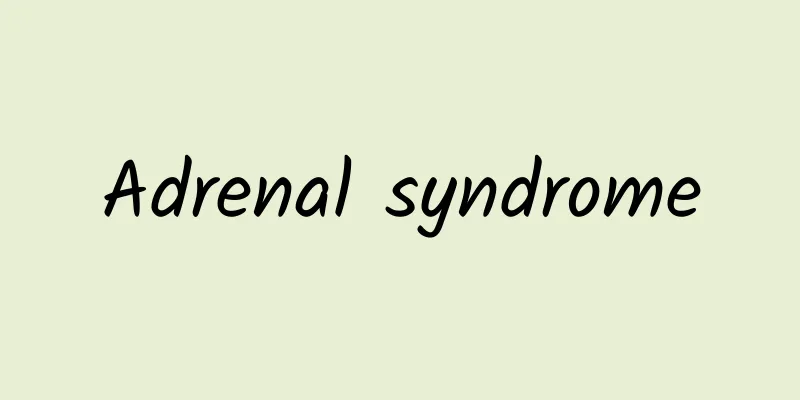How does anorexia develop? Causes of anorexia

|
Many patients don’t understand why they suffer from anorexia. In fact, there are many common causes of this disease, such as climate factors, diseases and drugs, bad eating habits or unreasonable diet structure. (1) Climate factors Excessively hot weather or high humidity can affect the nerve regulation function and the secretion of digestive juices and cause children to lose their appetite. Therefore, children's poor appetite is most obvious in summer throughout the year. The most common psychological factors for children's anorexia are: 1. Children's central nervous system may be exposed to adverse psychological stimulation such as fright, fear, tension, crying, etc., which may cause digestive dysfunction and loss of appetite. 2. Parents place too high demands on their children and restrict their children's activities, such as prohibiting them from playing with other children and scolding them before meals and at the table, which will affect children's mood and appetite and cause them to lose appetite. 3. When children have a poor appetite, forcing them to eat by force or intimidation often causes them to develop a rebellious mentality and refuse to eat. 4. Over-indulging and indulging children without limits will make them develop a willful habit of threatening adults with not eating in order to achieve their goals. 5. Irregular life, children go to bed too late, resulting in lack of sleep, excessive fatigue, and anorexia. 6. Eating too much at one time, "eating to death", or lack of companions of the same age during meals, or poorly cooked food, or a chaotic dining environment can all cause children to have a poor appetite and lead to anorexia. (2) Disease and drug factors Most illnesses can cause a child to have a decreased appetite. From minor colds to major gastrointestinal, liver and kidney diseases. When children suffer from diseases such as gastroenteritis, peptic ulcer, hepatitis or tuberculosis, anorexia is particularly prominent. If a child suffers from various diseases accompanied by fever, his digestion and absorption functions may be reduced, causing him to lose his appetite. In addition, severe zinc deficiency, intestinal parasitic infection, long-term constipation, or a long-term low-salt diet due to kidney disease may also cause a loss of appetite. After taking some drugs (such as erythromycin, sulfonamide drugs, etc.), due to their irritating effect on the gastric mucosa, children may also suffer from anorexia, which may be accompanied by abdominal pain, nausea, vomiting, etc. In addition, if children take too many calcium tablets, vitamin A or D, they may also experience loss of appetite. Generally speaking, when children suffer from mild, acute diseases such as upper respiratory tract infections, the poor appetite caused by fever will gradually return to normal in about three to five days after the fever subsides. Anorexia caused by drug factors can gradually disappear after stopping the drug for two or three days. Anorexia caused by chronic diseases can last longer. (3) Poor eating habits or unreasonable diet structure Giving children too many snacks on a regular basis; consuming too many cold drinks and beverages in the summer and eating at irregular times; parents paying too much attention to their children's diet or often forcing them to eat, etc., can all affect their children's normal appetite. Some parents are too indulgent to their children and do not give them enough protein (eggs, meat, milk) in their diet. Or the proportion of sugar (sweets, chocolate, etc.) is too large. If this continues for a long time, it will not only cause children to develop bad habits of partiality and picky eating. In addition, excessive intake of protein and sugar can also cause gastrointestinal digestion and absorption disorders or make children too obese. An unbalanced ratio of protein, fat, sugar, vitamins and trace elements in the food structure can also cause malnutrition in children and affect their growth and development. Therefore, we should pay attention to cultivating children's good habits of not being picky or partial to food from an early age. Staple foods and dishes should be as comprehensive and diverse as possible. In addition, giving infants stereotyped milk or rice flour feeding for a long time, or feeding them too much at one time can cause mild anorexia in children, but it is usually a one-time thing. Therefore, adding complementary foods to infants in a timely manner (such as steamed eggs, porridge with vegetable juice, noodles, etc.) is an effective way to enhance their appetite. |
<<: Check out the four symptoms of gallbladder polyps
>>: What to do if you have chest tightness due to bronchitis? Treat bronchitis promptly
Recommend
How many months will the fetal movement be swollen
Some women experience various reaction symptoms a...
Feeling of falling in the urethra after normal delivery
Pregnant women generally choose between natural b...
How to use Platycladus orientalis leaves to treat hair loss?
Platycladus orientalis leaves are the tender bran...
How to deal with bad breath caused by spleen deficiency? Regulate the spleen and stomach to get rid of bad breath
Bad breath is a very embarrassing thing. It affec...
How to treat dry cracked eczema
Eczema is a disease that is usually very complica...
Why is there less menstrual flow in summer?
In the summer, if the menstrual volume is small, ...
What to do if uric acid is high in physical examination
Uric acid is an indicator of human kidney functio...
What does itching on the outside of the nose indicate?
It is spring now, the climate is relatively dry, ...
Mesenteric lymphadenopathy
When it comes to mesenteric lymphadenopathy, some...
What are the methods of TCM to treat foot pain?
Foot pain is a common phenomenon in life. Althoug...
Tongkat Ali wine benefits
Tongkat Ali, also known as Tongko Ali, is a plant...
Is moxibustion useful for lumbar disc herniation?
Lumbar disc herniation is a relatively common dis...
How to remove blackheads on your face
Blackheads on the face are the most common skin d...
Song of Yangyin Qingfei Decoction
Our prescription for diagnosis and treatment is t...
What fruits can remove freckles?
In recent years, freckle removal has become the m...









